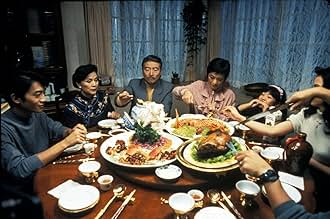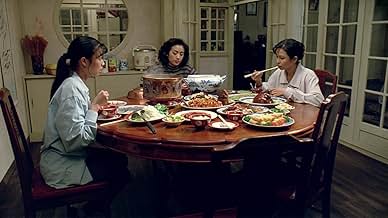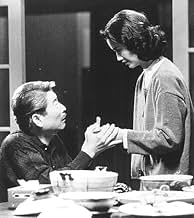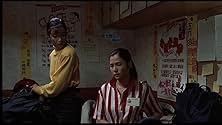IMDb RATING
7.8/10
24K
YOUR RATING
A senior chef lives with his three grown daughters; the middle one finds her future plans affected by unexpected events and the life changes of the other household members.A senior chef lives with his three grown daughters; the middle one finds her future plans affected by unexpected events and the life changes of the other household members.A senior chef lives with his three grown daughters; the middle one finds her future plans affected by unexpected events and the life changes of the other household members.
- Nominated for 1 Oscar
- 6 wins & 15 nominations total
Wang Yu-wen
- Jia-Ning
- (as Yu-Wen Wang)
Chen Chao-jung
- Guo Lun
- (as Chao-jung Chen)
Ah-Lei Gua
- Madame Liang
- (as Ya-Lei Kuei)
- Director
- Writers
- All cast & crew
- Production, box office & more at IMDbPro
Featured reviews
I came across Yin Shi Nan Nu just by chance, when one day I was sorting DVD's in my local store. I was curious about the name in Spanish, and I have seen other movies by Ang Lee, but I have never repented for my sudden decision to take the movie home. This is a brilliant portrait of a family on the verge of being torn apart by their personal differences and the ominous presence of modernity, which has started to undermine the roots of the traditional Taiwanese family life. The presence of traditional Chinese Cuisine, in which Chu is both a master and the heir to hundreds of years of knowledge, serves as the perfect background to place the characters, as a metaphor for a way of life that is quickly disappearing, threatened by fast food and changes in family values. The director does not, however, focuses on mellow or sweetened scenes to show the conflict, but he maintains a humorous tone throughout the movie, placing the actors' performances on subtle gestures and witty lines which rely heavily on understatement and comedy-like situations. The basic premise of the movie suggests that change is not only inevitable but also necessary. However, the old values still need to be cherished and passed on to the next generation since they are the foundations which give sense and meaning to a life which tends to assimilate happiness to disposable items and economic success. In doing so, Chu and her daughters get reconciled, as well as their traditional background comes to terms with modernity.
By now, Ang Lee is best known for "Crouching Tiger, Hidden Dragon", "Brokeback Mountain" and "Life of Pi". If you're not familiar with his earlier work, it's worth checking out. Key among it is 1994's Academy Award-nominated "Yǐn shí nán nǚ" ("Eat Drink Man Woman" in English). I understand that this was part of what has become known as Lee's Father Knows Best trilogy. In this case, an aging chef in Taipei tries to come to terms with the different career paths that his daughters have chosen.
Without a doubt, the best part of the movie is seeing the food prepared. The opening scene shows the father preparing a feast for himself and his daughters. And boy does he put in a LOT of effort! But as the movie progresses, it becomes clear that the meals are only half the story. There's also the events in the characters' lives, as they seek out relationships. Might it also be time for the father to seek out a relationship?
This is definitely one that I recommend. As I read somewhere, the assortment of food representations life: there's a lot available, but you have to decide what you'll choose. A fine one. Another one of Lee's good movies is "The Ice Storm" (a downer if there ever was one).
Without a doubt, the best part of the movie is seeing the food prepared. The opening scene shows the father preparing a feast for himself and his daughters. And boy does he put in a LOT of effort! But as the movie progresses, it becomes clear that the meals are only half the story. There's also the events in the characters' lives, as they seek out relationships. Might it also be time for the father to seek out a relationship?
This is definitely one that I recommend. As I read somewhere, the assortment of food representations life: there's a lot available, but you have to decide what you'll choose. A fine one. Another one of Lee's good movies is "The Ice Storm" (a downer if there ever was one).
10sochoi23
Being a female Asian American (1st generation), I definitely relate to the movie, especially the three daughters' devotion to their father and of maintaining and continuing family tradition. I loved the differences amongst the daughters: The older religious teacher daughter, the power executive daughter, and the teen aged daughter. However, no matter how their lives diverged, they were always brought back to the table by their ever-patient father. The little neighbor girl was absolutely adorable and the relationship between her and the father is endearing. The best scene is when she brings her lunch to school and the food is so lovely, tall of the children crowd around her and she's the hit of lunch period. Besides this movie, other Ang Lee films that are great are The Wedding Banquet and The Ice Storm and Crouching Tiger Hidden Dragon - need to see Sense and Sensibility and Brokeback Mountain (maybe even the Hulk), but this movie is my all time favorite - it makes me sad and wistful at times, but in the end, it always brings a smile to my face and touches my heart.
There is usually nothing that gets me away from my newspapers on a Sunday Morning. I usually spend several hours on my back porch immersed in news and entertainment. I flipped on the TV to see what was happening in the third round of the Masters and I noticed a movie on the Indie channel that I hadn't seen and it looked interesting. Big mistake! It Was And Lee's Yin shi nan nu (Eat Drink Man Woman). The paper got put aside as I couldn't tear my eyes away from the story. It was captivating, to say the least. How a widowed father deals with three daughters was the classic relationship film.In addition, the subplot, how everyone was doing something that they thought was "what was expected," instead of what they really wanted to do was a simple definition of life out of balance. Only when life is in balance can you taste the spice. You'll have to invest some time in watching this great film to understand that fully, and it will be time well spent.
Ang Lee has turned what might have been merely an extended Taiwanese soap opera into a wise and warm exploration of family relationships, love and friendship, against the backdrop of a traditional society adapting to the modern world. Fascinating in themselves, the food preparation sequences serve as a metaphor for the skill required to transform bare existence into a rich life (and perhaps also as a metaphor for film making, where similar care and deftness are required).
The film focuses on the strained relations between master chef Chu (Sihung Lung) and his three unmarried daughters, and on the relationships of all four in love and at work. These relationships run the gamut from first love to love the second time around; from those based almost solely on sex to those based on none. (Some of the most touching scenes are those between Chu and his older colleague Wen (Jui Wang.))
Via the various workplaces Lee subtly shows us the changing face of Taiwanese society. Despite her father's profession, and seemingly with his approval, his youngest daughter works in a fast-food outlet; the eldest has converted to Christianity, and teaches science to boys, who treat her with a mixture of traditional deference and western-style insolence; the middle daughter is a successful airline executive, but only because time-honoured attitudes debarred her, as a woman, from following in her father's footsteps as a cook.
Unlike the classic Hollywood film, there is little out-and-out conflict in this movie, which seems to be based more on the Chinese philosophical concept of Yin and Yang, mutually dependent opposites. But whatever its underlying cinematic rationale, it is a masterpiece.
The film focuses on the strained relations between master chef Chu (Sihung Lung) and his three unmarried daughters, and on the relationships of all four in love and at work. These relationships run the gamut from first love to love the second time around; from those based almost solely on sex to those based on none. (Some of the most touching scenes are those between Chu and his older colleague Wen (Jui Wang.))
Via the various workplaces Lee subtly shows us the changing face of Taiwanese society. Despite her father's profession, and seemingly with his approval, his youngest daughter works in a fast-food outlet; the eldest has converted to Christianity, and teaches science to boys, who treat her with a mixture of traditional deference and western-style insolence; the middle daughter is a successful airline executive, but only because time-honoured attitudes debarred her, as a woman, from following in her father's footsteps as a cook.
Unlike the classic Hollywood film, there is little out-and-out conflict in this movie, which seems to be based more on the Chinese philosophical concept of Yin and Yang, mutually dependent opposites. But whatever its underlying cinematic rationale, it is a masterpiece.
Did you know
- TriviaThe opening sequence - in which a Sunday lunch is lovingly prepared - took over a week to film.
- GoofsAs Chu is downing shots at the last Sunday dinner, he spills some on the collar of his jacket. When he stands up to makes his announcement, the stain is gone.
- SoundtracksAve Maria
Composed by Giuseppe Verdi
Performed by The Westminster Choir
Courtesy of Chesky Productions, Inc.
Details
- Release date
- Countries of origin
- Languages
- Also known as
- Comer, beber, amar
- Filming locations
- Production companies
- See more company credits at IMDbPro
Box office
- Gross US & Canada
- $7,294,403
- Opening weekend US & Canada
- $155,512
- Aug 7, 1994
- Gross worldwide
- $7,294,403
- Runtime
- 2h 4m(124 min)
- Color
- Sound mix
- Aspect ratio
- 1.85 : 1
Contribute to this page
Suggest an edit or add missing content





































